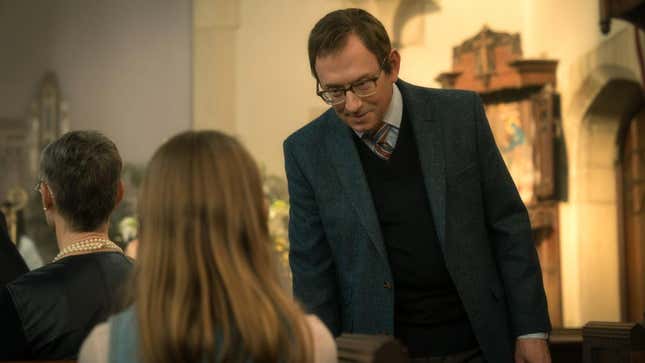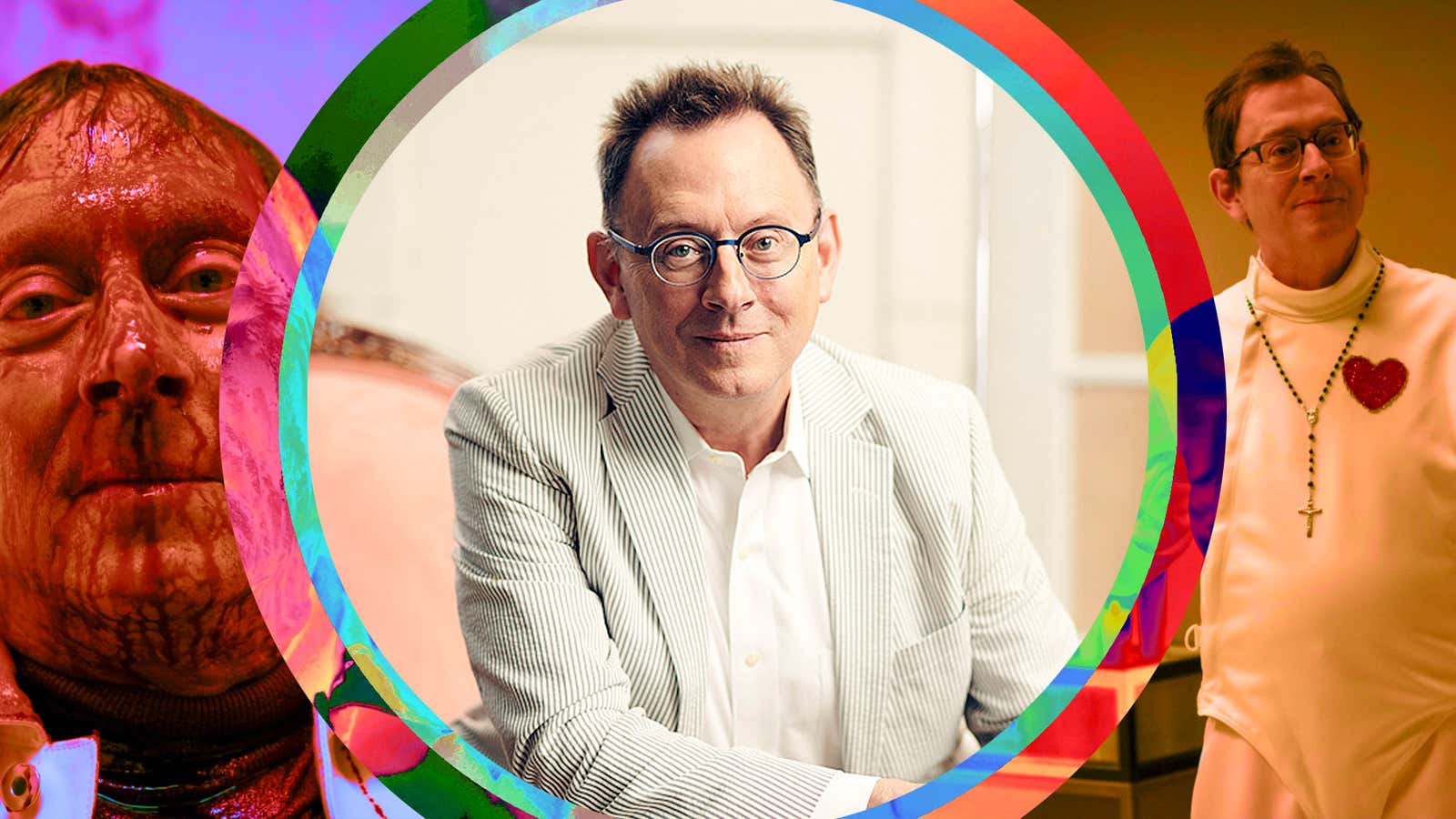The creepy, delightful Paramount+ drama Evil wrapped its second season run with multiple loose ends.
Created by Robert and Michelle King, the show balances complex scientific, supernatural and spiritual themes. It follows psychiatrist Dr. Kristen Bouchard (Katja Herbers), seminarian David Acosta (Mike Colter), and tech expert Ben Shakir (Aasif Mandvi) as they work to prove or disprove possible hauntings and miracles. They meet their adversary in Leland Townsend (Michael Emerson), who might just be working with the Devil himself.
In season two, Leland doubles down on his nefarious activities, especially toward the end of the season. He’s taken Kristen’s mother Sheryl (Christine Lahti) under his wing to help commit crimes. And in the finale, “C Is For Cannibal,” Leland is trying to manipulate Kristen’s daughter. He juggles all this while pretending to want an exorcism just to mess with priest-in-training David.
Leland loves chaos, and Emerson is aware that the trait is similar to one of his other well-known characters: Lost villain Benjamin Linus.
Emerson’s memorable TV performances have stayed with audiences, from The Practice to Lost to Person Of Interest, the latter of which lasted on CBS for 103 episodes. The A.V. Club spoke to Emerson about how he prepares for these monumental roles, being surprised by the Evil scripts, and the actor he wants to work with more in season three.
The A.V. Club: How much did you know about where Leland’s story is going to go? As his story progresses, he keeps going off the deep end, and your performance really reflects that.
Michael Emerson: Thank you, but I didn’t have any idea at all and I wouldn’t have it any other way. I’ve done long-running series before and sometimes even writers don’t know exactly where they’re going to go season to season. Sometimes when I get the scripts I’m amazed at the things I have to do or the things they’re having me say as Leland. I’m completely onboard with how much fun they’re having with this character. He does get more and more theatrical, and I have to say, he gets funnier as he goes.
AVC: The finale doesn’t fully explain what Leland has been up to because there are so many moving parts. What’s his endgame here with Sheryl and the blood transfusions or with Lexis and passing her that Daffodil note?
ME: A lot is as yet unanswered with that. Evil and Leland just have mysteries upon mysteries. I know what his basic agenda and mythologies are. It’s to create as much mayhem as possible and to push people’s buttons. He delights in that. Whatever rituals or organizations he may belong to, or what his office might be that includes demons or would-be demons, who knows. I’m as mystified by the finale as the viewers are. I will say that part of his work is recruitment and management. But I can’t tell yet if he’s a high officer or some bureaucratic drone in this great, dark enterprise.

AVC: Evil usually gives rational explanations for the case-of-the-week stuff the team deals with, except for when it comes to Leland. How does your ongoing storyline add balance?
ME: I think he is a constant landscape against which the leads are playing out their decisions or indecisions about good vs. evil, their beliefs and skepticisms. He’s there to make it harder for certainly Kristen and David. I guess Ben, too, but I haven’t really had many scenes with Aasif Mandvi. It might be fun in season three, if Leland continues to work with the core team, if there could be some fun face-to-face interactions with him. I think Aasif is so dry and funny in his portrayal. It would feel like dueling jokesters, except very dangerous.
AVC: I did like the one scene you had in early season two when Leland can’t remember his name and he casually says Ben. I thought it was a cheeky nod to Lost. On that note, you’re well-known for playing Ben Linus, who is another villainous character. Do you feel like Leland gets compared to him a lot?
ME: [Laughs.] Yes, that was a fun nod, indeed. People are usually inclined to package them together as two sinister characters that I’ve played. I have thought about it and the more that I do, the less overlap I see. Benjamin Linus is a tormented character in a spiritual crisis and he is earnest. I don’t think there is much playfulness about Ben, whereas Leland is having a blast with power and with powerful friends he never dreamt he would have in his life. If he is even human.
AVC: Well, we do get some of Leland’s backstory but without context of how much of it is really real. Do you know much about it, or do you and Kings talk about it?
ME: I’ve never actually had a discussion about where Leland comes from with them.
AVC: How do you prepare to step into the shoes of the character in that case?
ME: I do it like all the characters I’ve ever played. I read the text carefully and find their voice. If I can find one that seems to serve all the situations the character finds themselves in, half the battle is won. I like to be responsive to where the writing takes it. There are actors who want to be told and who want to sit down with creators and bat ideas around. I almost have a superstition against that. I don’t want to know. I want to wait till the scripts come to my computer. I’ll open it up and it’ll be a great surprise.
AVC: That’s very interesting. Has that always been the case even with Lost or Person Of Interest?
ME: Yes. I’ve learned to like it. I’m happy that way. At the end of the day, a knowledge of what came before or what’s going to come is not of any use to the actor. It can sometimes be a distraction because you might think “I have to play it this way because I know what’s coming in two episodes.” I want to be free of that. All I want to do is play the scene as straight as I can. Or as straight as my character can be.

AVC: Leland is certainly not that. He gets cheekier with every episode. It must be a lot of fun to play that.
ME: It’s all unexpected. The Kings have me doing things I thought I never would in my professional life, whether it’s doing funny dances in a field for a vision David is having, or being submerged in a tub of fake blood. I look at the script often and go “Really? I wonder how that is going to work.” And then it does.
AVC: Evil doesn’t necessarily take sides on the supernatural vs. science debate. Do you feel like your own views on these themes have evolved since you began working on the show?
ME: I suppose they have to the extent that we get these scripts full of personal dilemmas and challenges. Even if you’re not in crucial scenes, you’re reading the whole script and thinking, “Oh, this is an interesting take on this problem.” A lot of the problems on the show seem cut and dry and the answers seem obvious, but they get fully fleshed out. I then often think “Oh, I don’t know where the truth lays here.” As we make it, we experience some of that ambiguity some of the audience experiences.
AVC: Are you often most recognized for Ben Linus or Finch, and is Leland now climbing the charts? He walks such a fine line between being entertaining and frustrating, so people either love to love him or love to hate him. Are the reactions polarizing?
ME: You have put it correctly. It’s been about 50-50 with Lost and Person Of Interest. And now more and more, people will go “You’re that crazy demon guy.” But that’s the gamut. People half consciously like to confuse the actor with the character. They know it’s make believe but if you spend enough hours watching a person behaving a certain way, it’s bound to happen. If people stumble upon me on the street now, they’re taken aback.
AVC: Will your wife Carrie Preston make a cameo on Evil? You’ve appeared on each other’s shows in the past, with her on Person Of Interest and your role in Claws.
ME: She’s part of the Kings’ repertory so it would be cool. It could be that Carrie’s presence on Evil would come as a director rather than as a player. She’s directing The Good Fight and it would be an easy transition to come over to this one, even if it’s a different kind of show. It’s not out of the question. It would be fun and embarrassing. On set it’s like, “I know you and I don’t know you, and now I have to pretend that I don’t know you.” It always makes us giggle. It makes us shy.
